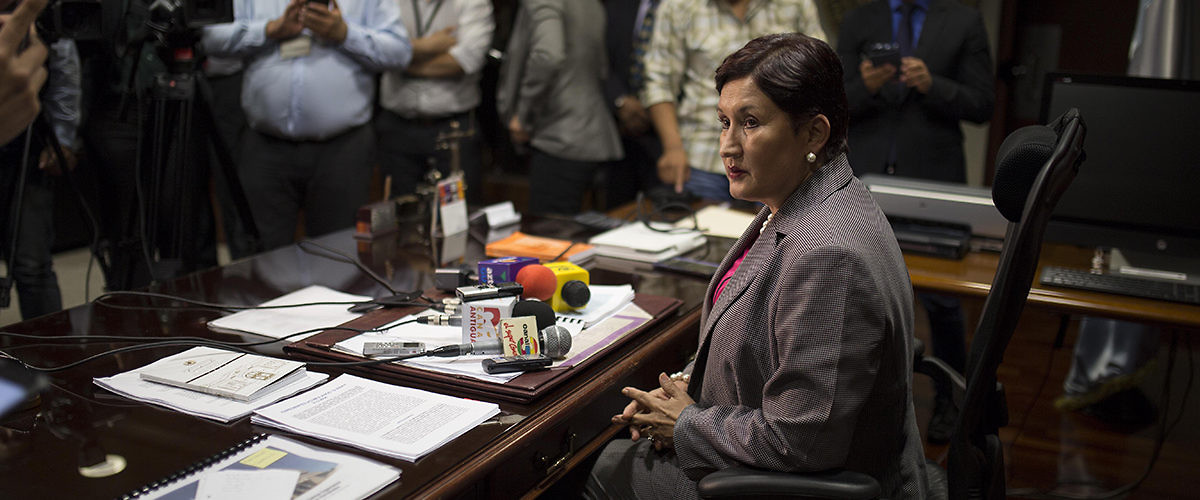Guatemalan Attorney General Thelma Aldana addresses the media after President Otto Perez Molina was stripped of immunity in the La Linea investigation. Guatemala City, Guatemala, September 1, 2015. (Luis Soto/AP Photo)
Guatemala is undergoing a process of political and social transformation that often escapes the world’s headlines. In the past two years, local authorities, working alongside the United Nations International Commission Against Impunity in Guatemala (CICIG), have dismantled the country’s largest criminal network.
These authorities have sent corrupt politicians including former President Otto Pérez Molina and Vice President Roxana Baldetti to prison and charged a further 53 political and economic elites with “co-opting the state.”
After 30 years of entrenched corruption and impunity, how is Guatemala achieving this radical overhaul? Attorney General Thelma Aldana, who is guiding the transformation with CICIG Commissioner Ivan Velazquez, said the role of civil society—particularly youth and students—was critical.
“Their voices kept the process honest and kept it moving despite the challenges encountered,” she told International Peace Institute Senior Policy Analyst Jimena Leiva Roesch during a recent visit to New York.
You were appointed as Guatemala’s top prosecutor in 2014. Did you imagine then the deep process of transformation you would trigger in the country?
When I became the top prosecutor the only thing I was thinking was that I wanted to work effectively; I wanted to contribute in however small way I could. One of the first meetings I had was with the UN Commissioner Iván Velásquez. From the beginning we agreed to work together; certainly two minds joined. It was an important coincidence that the two of us were there at the right time. Both of us agreed that we would not take a case to court until we had all the evidence to back it up.
The cases that you have brought to court have changed the history of Guatemala. Did you think this was possible?
I never imagined it was possible. I am still awestruck that the president (who appointed Ms. Aldana) was involved in the criminal network known as La Linea. I was equally shocked that the vice president was involved. Also, I never thought that Guatemalan citizens would react the way they did; that is the best part of the story.
Guatemalans from all walks of life got involved and continue to be involved. Guatemalans went to the streets and protested peacefully, offering an example to the world by demanding change with conviction and authority and without resorting to violence. Civil society had a prominent role. Particularly, the role of youth and students was critical; their voices kept the process honest and kept it moving despite the challenges encountered.
Do you think what was achieved in Guatemala can be replicated in other countries, or is this an exceptional case?
Yes, it is possible, if there is political will. There are many prosecutors willing to lead and many UN officials also ready to work with state authorities to dismantle criminal networks and entrenched corruption. What is required is the political will of the government to request the UN’s help. We can share the lessons learned and the experience gained.
What are currently the big challenges for you in this period of transition and potential transformation for the country?
The biggest challenge ahead will not be solved by my ministry or by CICIG. We are living through a historic process, but it is still very fragile. As we stand against those who believed they were above the law—and these are very powerful people—we are challenging the status quo. The reaction by the powerful sectors of Guatemalan society is to keep the status quo, so only Guatemalan society can lead in this moment ripe with opportunity for a new dawn.
How can the international community support this process?
First, it needs to be aware of how fragile this process is; that we are at a crossroads. It is still very easy to turn back. I think turning back would be the most dangerous option, as all the “mafias” would again be empowered. Sometimes in Guatemala it is claimed that the UN is impinging on our sovereignty, but, on the contrary, the mechanism set up is an example of the core mandate of the UN: it serves to support countries in their democratic process. The UN was created with the purpose of working with countries to achieve lasting peace and sustainable development.





